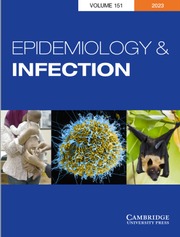Article contents
On the Incidence of Encephalitis Lethargica and Acute Anterior Poliomyelitis in Lancashire and Elsewhere
Published online by Cambridge University Press: 15 May 2009
Extract
Difficulties in cultivation outside the body have rendered the exact study of the immunity reactions of the filtrable viruses less easy than in the case of many of the bacteria, and the extension of our knowledge of immunity in these infections is at the present time largely dependent upon observation of the behaviour of human beings when exposed to infection through natural channels. For this reason it is important that the utmost use should be made of such reliable statistics as are available for the study of the epidemiology of such diseases as Encephalitis Lethargica and Acute Anterior Poliomyelitis, with a view to understanding their mode of spread and obtaining some clue as to how they may in the future be controlled.
- Type
- Research Article
- Information
- Copyright
- Copyright © Cambridge University Press 1932
References
page 221 note 1 The early history of encephalitis lethargica in England and Wales has been studied in a Ministry of Health Report, published in 1922. Reports on Public Health and Medical Subjects, No. 11.Google Scholar
page 221 note 2 League of Nations, Health Section. Monthly Epidemiological Report, 9, No. 8, August 15, 1930, pp. 329–333.Google Scholar
page 221 note 3 Urban districts of Great Harwood, Huyton, Leyland, Little Crosby, Little Lever, Poulton-le-Fylde, Urmston, Wardle, Widnes and the rural district of Sefton.
page 232 note 1 Ministry of Health. Reports on Public Health and Medical Subjects, No. 11, 1922.Google Scholar
page 235 note 1 Monthly Epidemiological Report, 9, Nos. 2, 3, pp. 47–70, 97–113, 1930.Google Scholar
page 237 note 1 It has been shown that when pairs of cases occur in the same family these usually develop within 2 or 3 days of each other, suggesting a common source of infection rather than that the first infects the second. This does not, I think, really invalidate the reasoning, though it needs to be borne in mind.
page 238 note 1 Journal of Preventive Medicine, 4, May, 1930, pp. 189–200.Google Scholar
- 8
- Cited by


